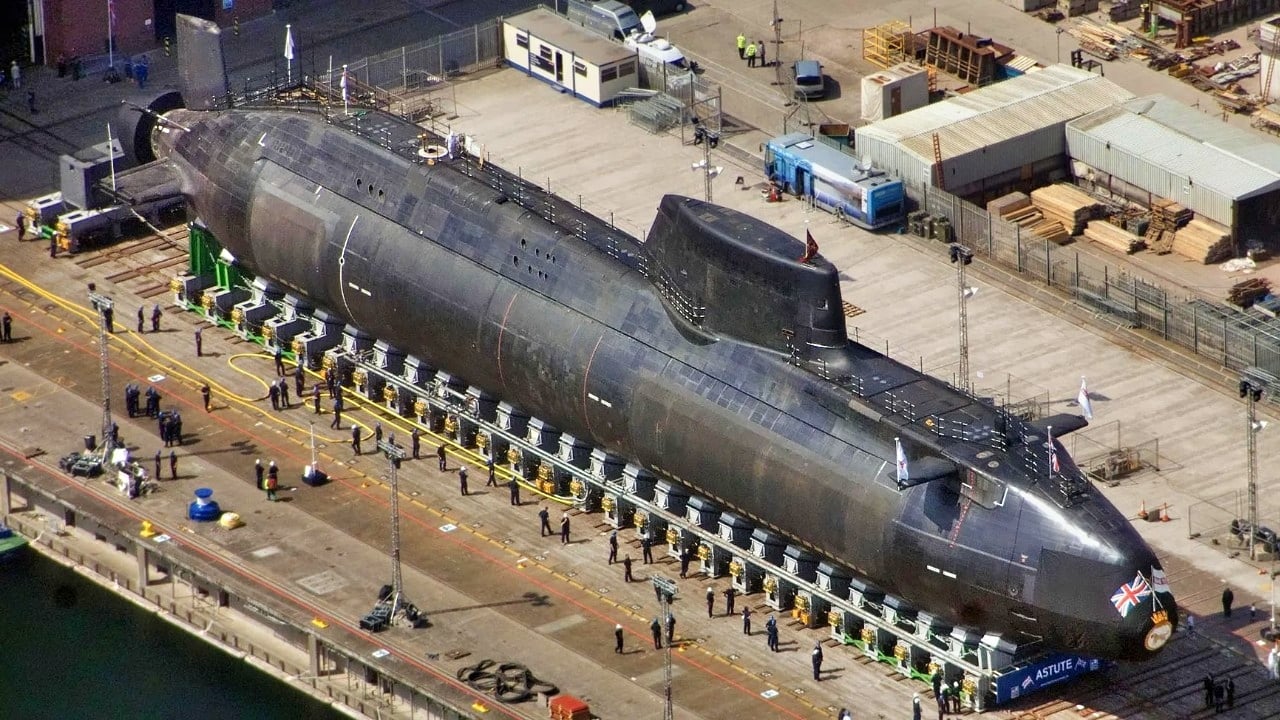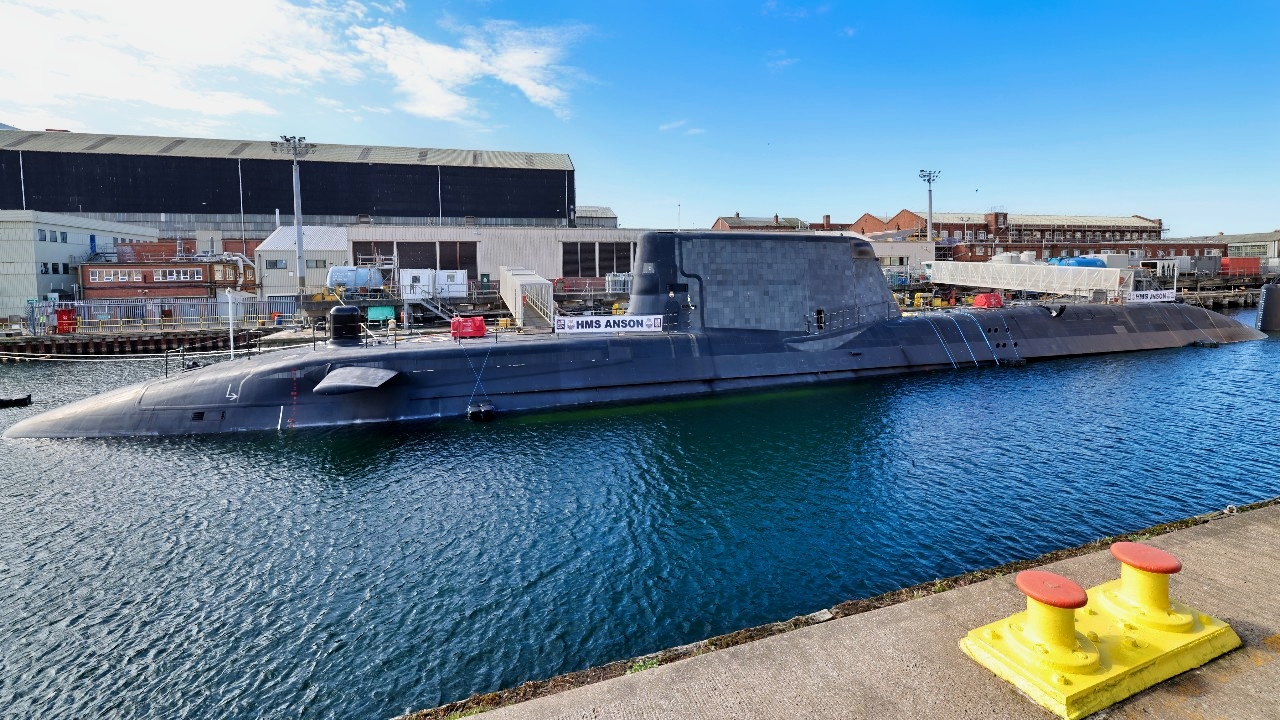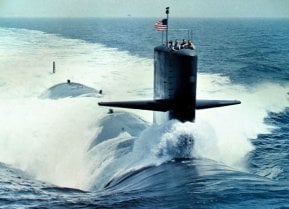You Can't Stop the Royal Navy's Astute-Class Stealth Submarine
The British Royal Navy, once the world's most formidable maritime force, has significantly diminished since World War II. However, it has maintained a focus on developing a world-class submarine fleet, with the Astute-class submarines being the latest testament to its engineering prowess.
What You Need to Know: The Astute-class submarines are a significant advancement in the British Royal Navy's capabilities, developed to replace the aging Trafalgar-class fleet. Built by BAE Systems, these nuclear-powered attack submarines feature cutting-edge technology, including the Astute Combat Management System (ACMS) and Communications band Electronic Support Measures (CESM), making them exceptionally stealthy and lethal.

-Armed with Tomahawk Block IV cruise missiles and Spearfish torpedoes, they enhance the Royal Navy's global strike ability.
-The Astute-class is considered by some to be superior to even the U.S. Navy's Virginia-class submarines. Part of a broader naval revitalization, they may also be offered to allies like Australia under the AUKUS agreement.
Astute-Class Submarines: Revitalizing the Royal Navy's Undersea Dominance
The British Royal Navy was once the greatest maritime force in history. Its reach was global and its competence on the High Seas was legendary. Since the Second World War, however, the Royal Navy has been laid low as Britain went from being the world’s dominant power to a middle-power in decline. Still, the Royal Navy as an institution did its best to preserve the legacy of their forebearers.
In the Cold War, the British rightly fixated on developing one of the world’s best submarine forces, believing that nuclear-powered submarines would be the primary capital ship of that age rather than any costly surface warship.
One of the Royal Navy’s primary attack submarines during the Cold War was the Trafalgar-class. These systems had served Britain well for decades. Of course, by the 2000s, they were aging and needed to be replaced.
BAE, the primary contractor for building Britain’s submarines, began working on a new nuclear-powered submarine, the Astute-class. The Royal Navy started decommissioning their old Trafalgar-class subs in 2009. The final sub of that model is due to be retired this year.
There are presently five Astute-class submarines in service of His Majesty’s Navy (with possibly more on the way).
The Specs of the Astute
The Astute-class submarine is an incredible work of engineering. It is a real reminder of the imperial majesty that His Majesty’s Navy once possessed up until a century ago. Some have even argued that Britain’s Astute-class submarine is better than the United States Navy’s Virginia-class attack submarines. That would make the Astute-class the best on Earth.

While that remains to be seen, the fact is that the Astute-class has an impressive array of systems helping to ensure its dominance in any engagement at sea.
The Astute Combat Management System (ACMS) is like something from Star Trek. The ACMS makes the Astute-class “as quiet as a dolphin.” Developed by BAE Systems Insyte, the ACMS “uses advanced algorithms and data handling” and “displays this data as real-time images on the command consoles.”
Further, the “platform management system on board the submarines controls and monitors the onboard systems. It is comprised of sensors, actuators, and remote terminal units and data processing that provides real-time information and diagnostics.”
Raytheon provides the main armament that the Astute-class carries. That’s the Tomahawk Block IV (tactical missile). Possessing a range of 1,000 miles and a maximum speed of 550 miles per hour, the Block IV is an excellent addition to the Astute-class sub that seeks to allow the relatively small Royal Navy to punch-above-its-weight.
This boat is equipped with six 533 mm torpedo tubes.
Besides the Tomahawk Block IV’s, the submarine can carry 36 torpedoes and missiles. It is armed with Spearfish torpedoes and mines. The Spearfish is wire-guided and has “a smarter electronic ‘brain’ and a fiber-optic guidance link with its parent submarine to improve its accuracy and lethality.” It is believed that the Spearfish can be equipped with a directed-energy warhead, too.
The Astute-class Might Be a Game Changer
Up next is the electronic support measures (ESM) suite. Operating alongside this integral system is the Communications band Electronic Support Measures (CESM) system. This latter program helps the Astute-class better defend itself via advanced communications, signal intercept, recognition, and direction-finding and monitoring capabilities. So, the Astute-class is not only a truly lethal killer but she is also incredibly difficult to kill.
The Rolls Royce PWR 2 Pressurized Water Reactor provides the power for this magnificent submarine.
What’s more, the Astute-class appears to be part of a larger revitalization program for the Royal Navy. This new breed of sub was sent down to Australia in 2021, shortly after the Aussies entered the Australia-United Kingdom-United States (AUKUS) nuclear submarine development deal between the three countries. While it was not initially offered to sell the Astutec-class model to the Royal Australian Navy as part of the AUKUS agreement, London has made clear they are open to it.
At a time when the Royal Navy has mistakenly obsessed over building expensive and unmanageable (given their navy’s size and level of support) aircraft carriers, the one area where the British Royal Navy has been on-the-mark has been with the development of this submarine. Let us hope that Britain can expand upon this success and that more of these submarines stalk our shared enemies for many years to come.
About the Author
Brandon J. Weichert, a National Interest national security analyst, is a former Congressional staffer and geopolitical analyst who is a contributor at The Washington Times, the Asia Times, and The-Pipeline. He is the author of Winning Space: How America Remains a Superpower, Biohacked: China’s Race to Control Life, and The Shadow War: Iran’s Quest for Supremacy. His next book, A Disaster of Our Own Making: How the West Lost Ukraine, is due October 22 from Encounter Books. Weichert can be followed via Twitter @WeTheBrandon.
All images are Creative Commons and/or Shutterstock.


